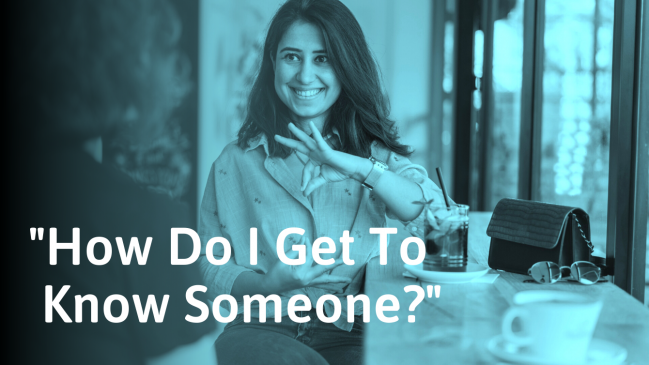Loads of our readers really want to make new friends. It’s probably the number one complaint people have about their lives.
There are two steps to making new friends. First, you have to find new people you have something in common with. Once you’ve found people you might like to be friends with, though, you still have to put the effort in to get to know them better.
This can be even more intimidating than finding them, especially if you’ve got your hopes up about your potential new friend. We’re going to break down the most important tips to help you get to know someone better without getting stressed out.
Sections
- How to get to know anyone better
- How to get to know strangers
- How to get to know someone as a friend
- How to become close friends
- How to get to know someone you’re interested in dating
How to get to know anyone better
There are some tips that are important for getting to know someone better, no matter how well you know them already.
Here are the most important tips to help you get to know anyone better.
1. Make the other person feel good
To get to know people better, you want them to feel good when they’re around you. This means feeling safe, respected, and interesting. Lots of our advice is designed to make the other person feel good about you and themselves, but here are some simple tips:
- Drop topics if they start to look uncomfortable (looking away, changing the topic, crossing their arms across their chest)
- Avoid distractions (such as your phone) when you’re talking to them
- Treat their opinions with respect, even if you disagree
- Be interested in them
2. Share information about yourself
Sharing information about yourself is essential to getting to know someone better naturally. Research suggests that the fastest way to get to know someone and make a new friend is to alternate telling information about ourselves and letting them tell us something about them. Each time you repeat this, it can be slightly more personal information.[1]
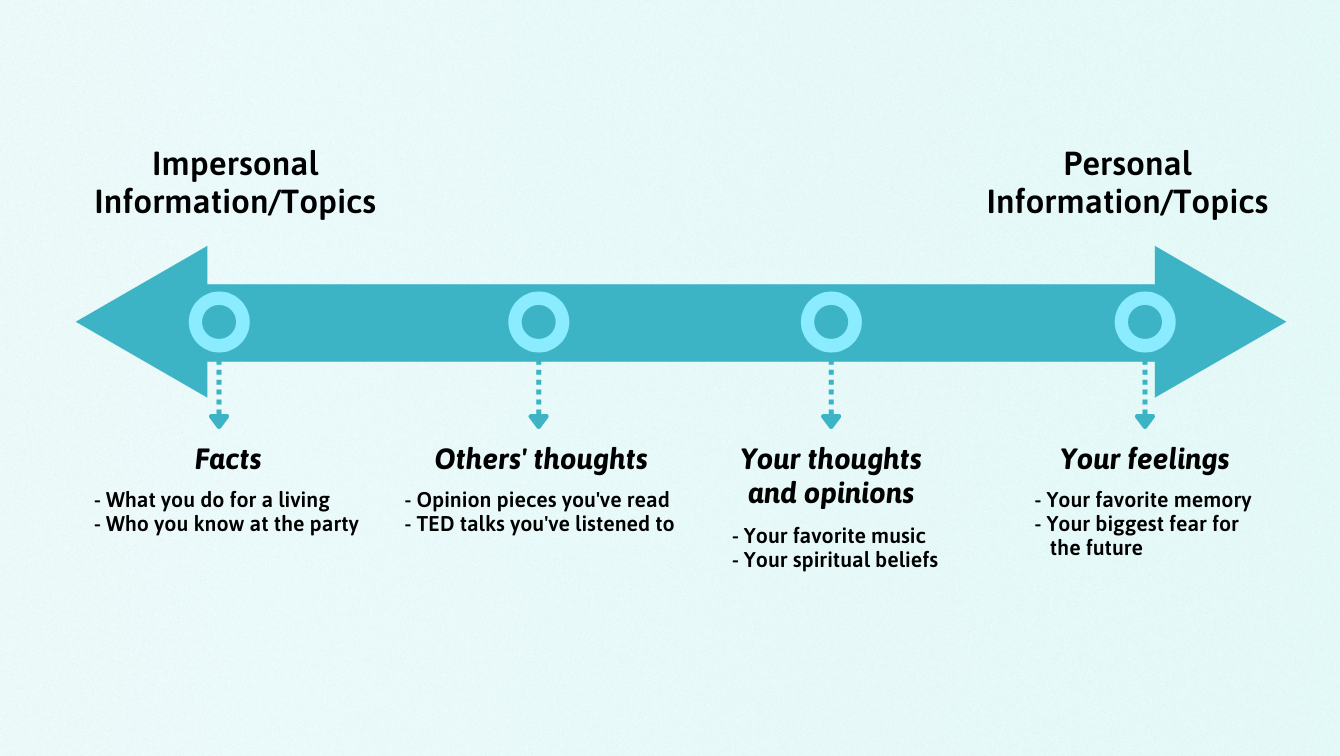
Be thoughtful with the information you share. Avoid trying to one-up their stories or letting them feel uncomfortable. If you notice them looking away or changing the subject, try being slightly less personal until you know them better.
3. Be present
Getting to know other people relies on you being present enough to pay attention to them.
The most basic step to becoming more present is to leave your phone in your pocket. Looking at a screen (even just to check something quickly) creates a sense of distance between you and them, and moves your attention away from them.[2][3]
Being present lets people feel important and interesting and makes it easier for you to notice things they say and do and really start to understand them as a person.
4. Practice active listening
The next step from being present is to practice active listening when you’re getting to know someone. It’s easy to spend the parts of a conversation when other people are talking thinking about what you are going to say next. This means you’re not really listening to the other person, which they will almost always pick up on.
Practicing active listening, where you really focus on the other person, helps to show them that they’re important to you.[4] If you’re not sure how to practice active listening, we have tons of ideas in our article on how to be a better listener.
5. Be honest
It can be tempting to try to make yourself seem more exciting or interesting when you’re trying to make friends with someone you just met. Unfortunately, this often backfires.
It’s better to stick to the truth than say what we think the other person wants to hear. Disagreeing with someone or telling them that you don’t share their interests doesn’t have to be difficult or awkward.
Focus on being polite and stating your opinion with respect. You could say, “That’s really interesting. My take on that is…” or “That sounds really cool, but I tend to prefer…”
6. Remember things that matter to them
Show that you care by remembering the things that matter to people. This could be giving them their favorite type of tea, remembering their birthday, asking how their job interview went, or lending them a book they’d mentioned wanting to read.
It’s not easy to remember everything someone else tells you, so focus on the things that seem most important. You can make notes on your phone or put someone’s birthday or special event into your calendar.
Although remembering things about people is generally positive, be careful not to come across as creepy. Show that you’ve been paying attention without being intrusive.
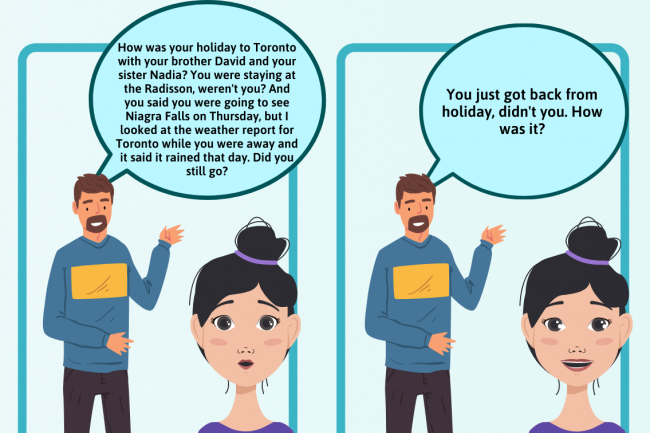
7. Find mutual interests
Mutual interests are a great way to get to know someone better. It lets you skip the small talk with acquaintances and gives you natural ways to spend more time with friends.
Try dropping your interests into the conversation and see how the other person responds. If they don’t seem interested, mention another habit a little bit later.
Focusing on what you have in common makes it easier to find things to do together and to know what to talk about.
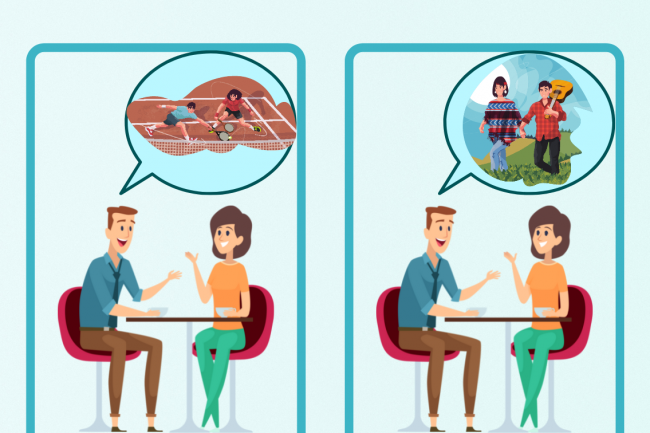
8. Be patient
Becoming friends isn’t a fast process, even with someone you “click” with. One of the most damaging things for a budding friendship is any pressure to become close more quickly.
Research suggests that becoming best friends takes at least 300 hours spent together.[5] A casual friend is usually someone you’ve spent over 30 hours with, and a friend takes about 50 hours.
Try to relax about getting to know someone better, and remind yourself that it will take time.
How to get to know strangers
Talking to strangers can be intimidating and uncomfortable, but it’s the first step to making new friends. Here are some of the best ways to quickly get to know a stranger better.
1. Know how to use conversation starters
Conversation starters are just that; they’re the start of a conversation. Throwing out lots of conversation starters without following them up is like listening to the first 10 seconds of lots of different songs rather than listening to one all the way through.
For the person you’re talking to, it often feels like an interrogation. Worse, they’re also left with the feeling that you don’t actually care about their answers.
Conversation starter questions let you begin learning something about the other person. Asking someone where they went on holiday doesn’t tell you much about them. Following that up with asking why they chose that place can tell you much more.
For example, if their last holiday was in Nevada, you might assume that they went to Vegas. Asking why Nevada might reveal that they were visiting family or that they’re trying to go lake swimming in every US state.
2. Choose the right conversation starters
You can find thousands of conversation starters and questions to get to know someone online. Not all questions will work well for you, though. Choose ones that lead to conversation topics you are interested in.
For example, “what’s your favorite form of social media” might be a great conversation starter if you are genuinely interested in how people use social media or how social media impacts face-to-face social interactions. If you only have a Facebook account that you haven’t checked in the last 2 years, you’ll probably be bored.
Think about how you’d answer the question. If you don’t have much to say, choose a different topic. If it feels too personal, the other person might find it a personal question as well. You could save that question for a later conversation.
Good conversation starter questions are:
- Open-ended
- Only slightly personal
- Slightly unusual, but not weird
- Sometimes thought-provoking
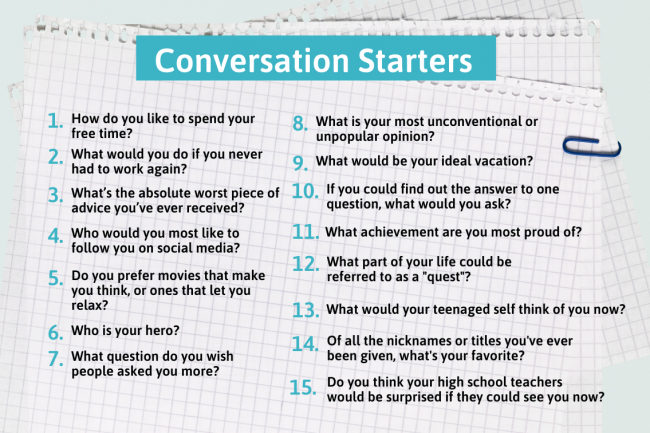
3. Be brave enough to open a conversation
Starting a conversation with someone you’ve met for the first time can be daunting, but it’s essential for getting to know them.
The biggest obstacles to opening a conversation with a stranger are worrying that you’re intruding or that they might reject you. Although these are normal concerns, studies show that they’re almost always unfounded.
Researchers asked people to spend their commute talking to the person next to them or sitting in silence. People enjoyed their journey more when talking to strangers, despite predicting the opposite. Importantly, no one rejected their conversation.[6]
If you’re nervous about starting a conversation with a stranger, try reminding yourself that your approach will most likely be welcome and that you’ll both have a more enjoyable day as a result.
4. Smile (naturally)
Smiling is one of the simplest ways to show that we are interested in other people and that we’d welcome a conversation.
Smiling in a social situation makes it more likely that people will approach you for a conversation and respond positively if you start one.[7]Smiling people look friendly, engaged, and kind. We’re less scared of being rejected if we try talking to them. Let other people feel confident approaching you by smiling.
If you’re not confident in your smile, check out our article on how to have a natural and engaging smile.
5. Believe in small talk
Lots of us want to skip the tedious, small talk stage of conversations. Unfortunately, although small talk can be boring, it is important.
Small talk lets us build trust with people we don’t know yet.[8] We talk about unimportant topics while we decide how comfortable we are with the other person.
When you’re tempted to skip the small talk, remind yourself that it isn’t about the conversation topic. Try to see it as a chance to decide whether you’d like to talk to the other person more and to let them do the same.
If small talk still feels uncomfortable, check out our in-depth guide to making small talk.
How to get to know someone as a friend
Once you’ve got to know someone as an acquaintance, you have the chance to decide whether they are the kind of person you would like as a friend. Use these tips to start trying to build a friendship.
1. Make time for them
Building a friendship takes time and effort, especially as an adult. At school, it was probably easier to make friends. You and your new pal spent most of the day together. As adults, with work and responsibilities, you need to decide to devote time to building a friendship.
Try to find fun ways to have a regular catch-up “date” with the other person. You could meet up once a week to chat, text them at the weekend to check in, or have a regular baseball game.
2. Accept them for who they are
As you get to know someone better, you’ll probably find things that you disagree on. To create a strong friendship, you need to show the other person that you accept them for who they are and that you respect them.
This doesn’t mean you have to accept unacceptable behavior. If someone doesn’t respect your boundaries or has views you find abhorrent, you don’t have to continue to build the friendship.
When you do disagree with a friend, be curious about their viewpoints without trying to change their mind or telling them that they’re wrong. You could say, “I don’t agree, but I’m really interested in your thoughts on this.”
3. Spend time together in social settings
As you’re starting to get to know someone as a friend, it can be helpful to see them in different social environments. People can respond differently depending on how many people are around and who those people are. Seeing your new friend in different situations lets you see another side to them and understand them more fully. It also lets them do the same.
Prioritize settings that are a regular part of your life; going to a party, a community event, or even volunteering together. Check that you’re comfortable with how your friend behaves in these situations.

4. Text or message appropriately
Most of us live busy lives and often find that we don’t have as much time to spend with someone face-to-face as we’d like. Most friendships are conducted, at least partly, through texts or online messaging. Good message etiquette makes it easier for people to relax around you.
One mistake people make when trying to get to know someone via text is sending messages without asking questions. Obviously, you don’t want the other person to feel like they’re being interviewed, but questions give the other person something to reply to.
Try to make sure that you don’t text too much, either. Having a text conversation is great, but sending 5 or 6 texts in a row without being answered can seem clingy or needy.
5. Connect on social media
Social media is integrated into most of our lives, but it can be an advantage when getting to know someone better.
There are two main advantages of connecting with a new friend on social media. It can make it easy to have regular conversations and get to know each other naturally, without the pressure of finding time to meet up in person.
You can also check out the other person’s profile before investing much time in the friendship to get a better idea of whether this is someone you really want to be friends with, and they can do the same for you.
Here are some tips for making the most of social media connections
- Keep your profile up-to-date and honest
- Don’t just rely on public messages. Talk privately as well
- Respond reasonably promptly
- Don’t neglect face-to-face interactions
How to become close friends
Sometimes, you realize you really trust a friend and enjoy spending time with them. You might want to build a deeper friendship with that person.
Here are some suggestions for how to become better friends quickly.
1. Spend time one-on-one
Being comfortable in social situations is great for getting to know people as a casual friend, but becoming close friends with someone almost always means spending time with just the two of you. This is even more important if you’re trying to get closer to someone you want to date.
Spending time together without other people makes it easier to exchange confidences and build trust, which is essential to a deep friendship. It also gives you space to concentrate on each other and really boosts your understanding.
Suggest meeting up for a coffee or a walk with just the two of you or doing some other activity where you can still talk.
2. Share more personal information
One of the clearest signs that we trust someone is that we share personal information with them that we wouldn’t share with others. We also like people better when we feel that they like and trust us.[9]
Sharing information about yourself encourages the other person to open up about themselves without asking them tons of questions.[10]
You need a balance between getting to know them and letting them get to know you. This means being honest and communicating your likes and dislikes, as well as personal boundaries.
Try to accept that this will probably feel vulnerable and uncomfortable at first. The good news is that sharing information about ourselves and our feelings can make it easier to deal with difficult parts of our lives and build a better support network.
3. Retain your independence
Building a close friendship is great, but it’s important that you don’t lose sight of who you are as an individual. Make sure that both of you still have your own space and that you don’t neglect other friends.
This means being firm about your personal boundaries, not regularly canceling other events to hang out with them, and not feeling pressured into sharing more than you want to.
How to get to know someone you’re interested in dating
Becoming close friends with someone is very similar to getting to know someone you want to date. There are some things to consider if you’re looking for a romantic connection rather than a new BFF.
1. Let them know that you see them that way
Probably the most intimidating part of trying to get to know someone you’re attracted to is letting them know that you’d like more than a platonic friendship with them. You’re opening up, and they might not feel the same.
Unfortunately, there isn’t a good alternative. Just hoping that they’ll notice your feelings and take the first step is rarely effective. It can even look a little creepy sometimes.
Telling someone you like them romantically doesn’t have to be a big deal. Explain that you don’t want to put them under any pressure, that you value your friendship, but that you’re also attracted to them and ask if they feel the same way. For more suggestions, check out our in-depth guide to how to tell a friend you like them as more than a friend.
If your feelings go deeper than this, check out our advice on how to tell someone you love them.
2. Close the emotional gap if you’re long-distance
Getting to know someone romantically can be considerably harder long-distance. Despite the physical gap, try to create a sense of emotional closeness between you.
This might mean sharing confidences or personal information more quickly than you might normally. You might also want to give little bits of information about your day and how you spend your time to let you feel part of each other’s lives.

3. Know what you want from online dating
Online dating can let you meet the guy or girl of your dreams. It can also be a huge drain on your self-esteem. Understanding what you’re looking for from online dating before you start can help you to get to know people who will be right for you and make it easier for them to get to know you.
Choose your online dating app carefully. If you’d like to be in a relationship, try looking at Hinge. If you’re happy with a more casual hookup, consider making a Tinder account.
Being honest about what you are looking for in your online dating might reduce the number of matches you make, but it makes it easier to find people you really connect with.
